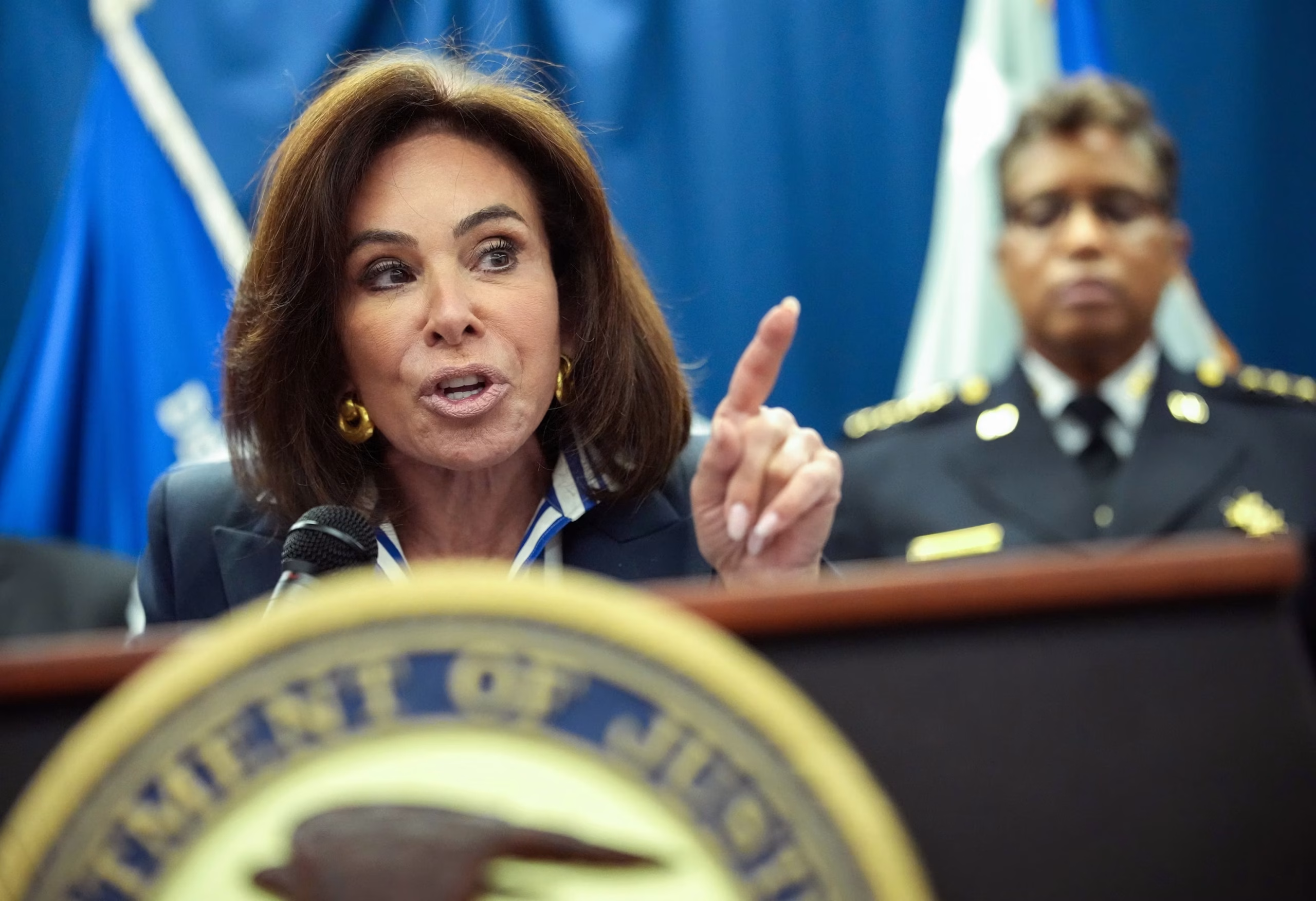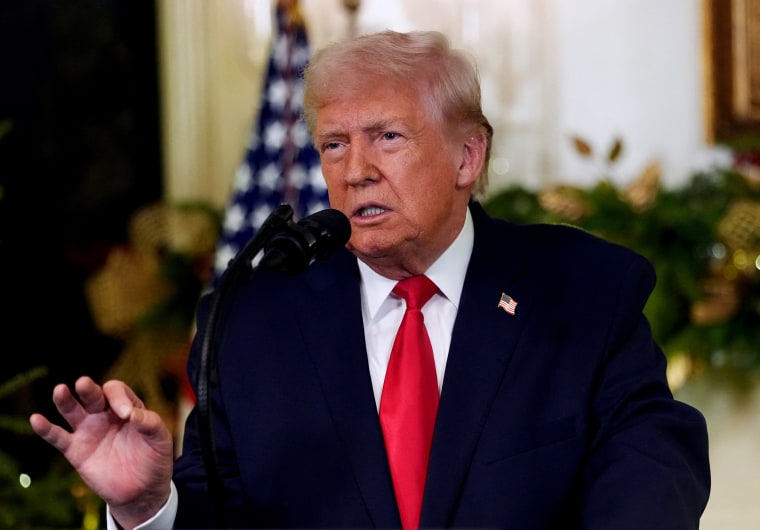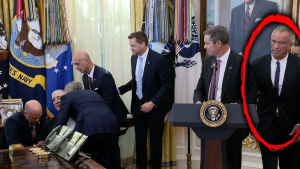The U.S. capital witnessed an unusual yet politically charged courtroom drama this week after Sean Dunn, a former Justice Department staffer, faced trial for hurling a sandwich at a federal agent during one of Washington’s most heated nights of protest. The case — centered around what prosecutors described as an “act of interference” and defense attorneys called a “symbolic act of frustration” — unfolded against the backdrop of President Donald Trump’s controversial law enforcement surge in the nation’s capital.
The incident, which occurred on August 10, 2025, quickly became emblematic of the deep divisions over the administration’s expanded use of federal agents and National Guard troops in major cities. Trump’s decision to increase federal policing powers in Washington was part of his broader initiative to combat what he called a “crime crisis spiraling out of control.” The move, however, drew sharp criticism from local leaders and civil liberties advocates who accused the administration of heavy-handed tactics and unnecessary escalation.
On that summer evening, Dunn — who had previously worked on international legal affairs for the Justice Department — joined a group of residents expressing frustration over the influx of armed agents patrolling nightlife areas. Witnesses said the situation escalated when Dunn confronted a team of U.S. Customs and Border Protection officers stationed near a busy D.C. street corner.
According to court documents and video footage later shared online, Dunn shouted at the officers, calling them “fascists,” before flinging a sub-style sandwich in their direction. The sandwich struck Agent Gregory Lairmore, a 23-year veteran of the agency, who later described the event in vivid detail during testimony: “There was mustard everywhere, and a few onions ended up hanging off my radio antenna,” he recalled, prompting subdued laughter in the courtroom.
Though the exchange appeared comical to some observers, the Justice Department treated the incident seriously. Prosecutors charged Dunn with assaulting and impeding a federal officer, initially seeking felony counts before a grand jury declined to indict on that level — a setback that underscored growing public skepticism of the department’s tactics during the crackdown. The charges were later reduced to a misdemeanor assault case, but the political undertones remained.
During the three-day trial in federal court, prosecutors argued that Dunn’s actions were not merely symbolic but a deliberate effort to interfere with federal law enforcement operations. Assistant U.S. Attorney Michael DiLorenzo told jurors that “free speech does not extend to physical aggression — even if the object is a sandwich.” He added, “That’s where the defendant crossed the line. His words were protected. His throw was not.”
The prosecution emphasized that officers in the area faced heightened risks and needed to respond decisively to any perceived threat. “In an environment where tensions were already high,” DiLorenzo said, “a thrown object — no matter how trivial — could easily trigger panic or escalation.”
Defense attorney Sabrina Shroff countered with a markedly different narrative. She portrayed Dunn as an impassioned but peaceful citizen overwhelmed by frustration at what he viewed as an unnecessary show of force. “We all know this was not a weapon thrown with intent to harm,” she said in closing arguments. “It was a harmless gesture of exasperation — a symbolic act of protest against an administration that treated its own citizens like enemies.”
Shroff also pointed to the lighthearted response from law enforcement following the incident, noting that Lairmore’s colleagues had gifted him a novelty patch reading “Felony Footlong” and joked about the “sandwich assault” around the precinct. “The officers themselves recognized how absurd this case was,” she told the jury.
Despite the humor, the trial reflected serious political undercurrents. Dunn’s act became a rallying point for activists and commentators who saw the case as a test of proportional justice under the Trump administration. Social media amplified the debate, with some mocking the federal government for “criminalizing sandwiches,” while others argued that “assault on an officer is assault — no matter what’s thrown.”
Prosecutors maintained that Dunn’s behavior went beyond a mere prank. They played footage from officers’ body-worn cameras showing Dunn shouting, “I want you out of our streets,” and taunting the officers before throwing the sandwich. DiLorenzo insisted this demonstrated an intent to distract and provoke law enforcement: “He wanted to draw officers away from their assigned posts, and he admitted as much on video.”
Lairmore, the only agent called to testify, said he did not believe Dunn meant to cause serious harm but stressed that such acts cannot be dismissed. “We were on edge that night,” he told the court. “You don’t know what’s being thrown at you until it hits. It could’ve been anything.”
Jeanine Pirro, the U.S. attorney for Washington and a close ally of President Trump, issued a statement following the proceedings, underscoring the government’s position: “Law enforcement should never be subjected to assault, no matter how ‘minor.’ Even children are taught that when they’re angry, they cannot throw things at others. We expect no less from adults.”
Outside the courthouse, Dunn struck a defiant yet emotional tone when addressing reporters. “I am relieved that justice has been served, but let’s be honest — this should never have gone this far,” he said. “That night, I believed I was standing up for the rights of immigrants and residents being intimidated by their own government. If that makes me a criminal in some people’s eyes, so be it.”
The episode, though seemingly minor in physical consequence, became part of a larger conversation about the role and limits of protest in an increasingly polarized America. Civil liberties groups weighed in, calling the prosecution “an extreme overreach for a trivial act” and urging the Justice Department to focus on “real threats rather than symbolic dissent.”
Trump’s supporters, on the other hand, argued that the incident reflected a broader pattern of disrespect toward law enforcement, echoing the administration’s stance that the federal presence was necessary to restore order in what Trump described as “lawless liberal cities.”
The federal surge in Washington, initiated in early August, led to a visible increase in uniformed officers across entertainment districts and government zones. While official data showed an initial drop in property crime, reports of confrontations between residents and federal agents also spiked. Critics accused the administration of militarizing local policing and using federal power for political optics.
Dunn’s case captured these tensions perfectly — a literal food fight that became a metaphor for the culture wars simmering beneath the surface of American politics. It symbolized how even the most absurd incidents could become battlegrounds for deeper issues: the limits of protest, the power of the state, and the fragile relationship between citizens and authority.
As court proceedings concluded, many in Washington reflected on the broader meaning of the case. Was Dunn a provocateur or a frustrated citizen pushed too far? Was the government’s response an assertion of order or an overreach of power?
Whatever one’s interpretation, the “sandwich incident,” as it came to be known online, will likely linger in public memory — not for its comedic undertones, but for what it revealed about the state of American dissent in 2025. It was a reminder that even something as ordinary as a sandwich could, in the right context, ignite a national debate about freedom, frustration, and the fine line between protest and crime.
In a city already brimming with political theater, Sean Dunn’s thrown sandwich became both absurd and profound — a symbol of a moment when America’s divisions were so deep that even lunch could become an act of rebellion.

Emily Johnson is a critically acclaimed essayist and novelist known for her thought-provoking works centered on feminism, women’s rights, and modern relationships. Born and raised in Portland, Oregon, Emily grew up with a deep love of books, often spending her afternoons at her local library. She went on to study literature and gender studies at UCLA, where she became deeply involved in activism and began publishing essays in campus journals. Her debut essay collection, Voices Unbound, struck a chord with readers nationwide for its fearless exploration of gender dynamics, identity, and the challenges faced by women in contemporary society. Emily later transitioned into fiction, writing novels that balance compelling storytelling with social commentary. Her protagonists are often strong, multidimensional women navigating love, ambition, and the struggles of everyday life, making her a favorite among readers who crave authentic, relatable narratives. Critics praise her ability to merge personal intimacy with universal themes. Off the page, Emily is an advocate for women in publishing, leading workshops that encourage young female writers to embrace their voices. She lives in Seattle with her partner and two rescue cats, where she continues to write, teach, and inspire a new generation of storytellers.









